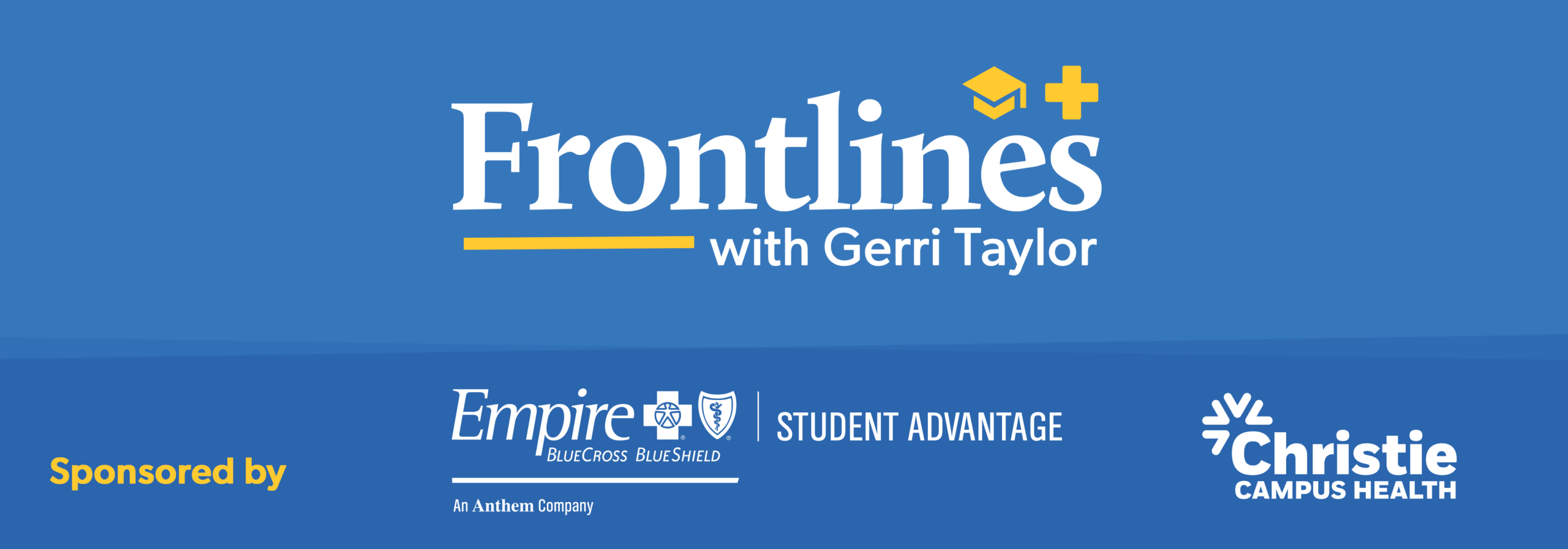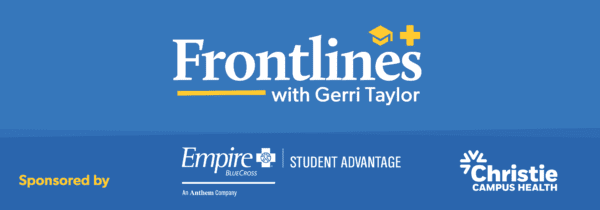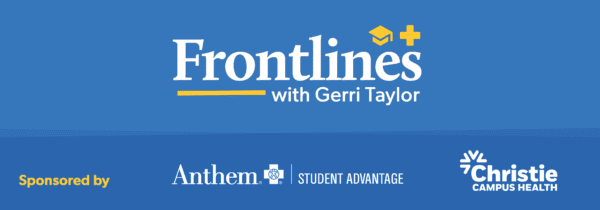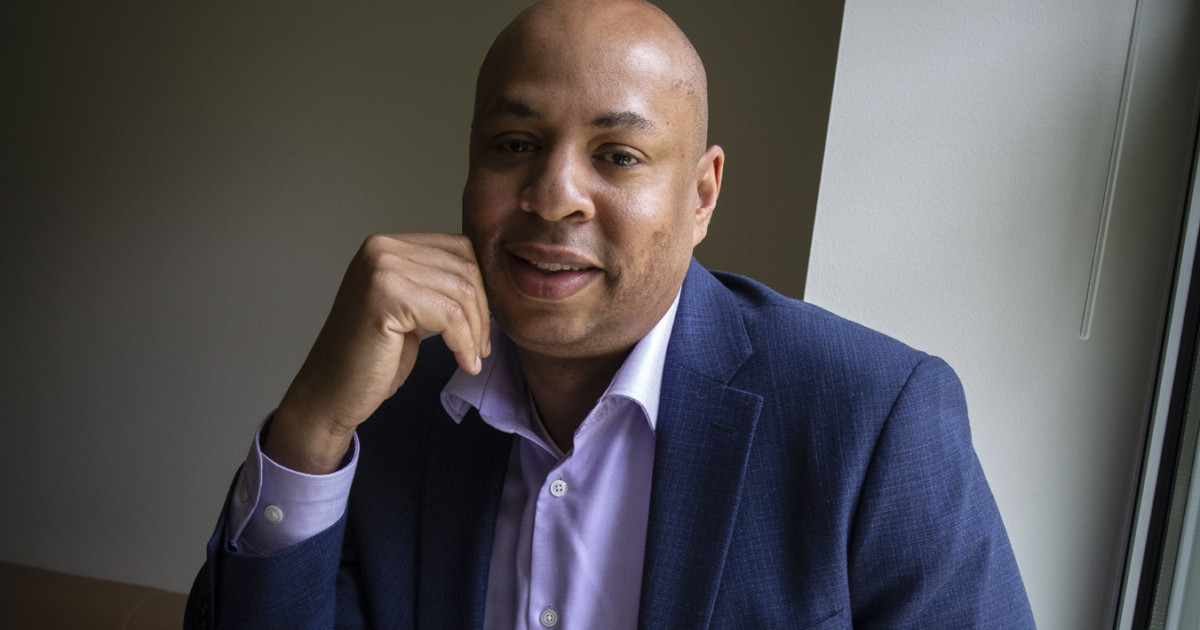
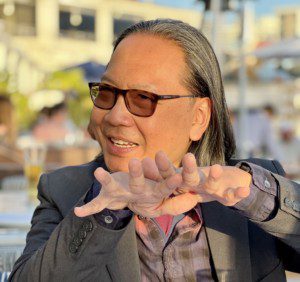
Giang Nguyen, MD, MPH, MSCE
This FRONTLINES interview gives a fascinating look at an eloquent leader in college health whose journey, family values and wisdom are examples of excellence and expertise; Dr. Giang Nguyen is a model for all college health centers. His journey began in Saigon, Vietnam, leaving for the United States one week prior to the fall of Saigon.
I have known Giang Nguyen for the past 2 ½ years as a gifted colleague on the American College Health Association (ACHA) COVID-19 Task Force. With experience as a physician, a public health specialist and an epidemiologist, he is the Associate Provost for Campus Health and Wellbeing, the Executive Director of Harvard University Health Services, and the Henry K. Oliver Chair of Hygiene at Harvard. He also co-chairs the ACHA Campus COVID-19 Vaccination and Mitigation Initiative (CoVAC).
Gerri:
Tell me a little about where you grew up and your path to becoming a physician?
Giang:
I was born in Saigon in Vietnam during the war. My father was in the military, partnering with the American military in the Signal Corps. My mother was a teacher. While my father’s military job was focused on cryptography and military communications, he was also an educator. Both my parents were teachers, so I think that teaching and education are somewhat in my blood. They went to college in Vietnam, and later sought further education in the United States, but they were lucky enough to have some good education in Vietnam as well. My father’s dream was to be a doctor, but the political turmoil for decades in Vietnam prevented him from following that path. He really wanted his children to become doctors. My one sibling, a sister, had no interest in doing so and went on to become an electrical engineer. My interest in medicine was really solidified in late high school and as an undergraduate at Johns Hopkins, when I was able to connect the dots between basic science, clinical considerations, and public health. It was during my undergraduate years when I became exposed to public health as a discipline. Ever since, I’ve found ways to integrate clinical medicine and public health into my career.
Gerri:
You then earned an MD, but did you get an MPH (Master’s in Public Health) as well?
Giang:
Yes. I received my MD and my master’s in public health as part of a dual degree program. After residency, I also did a fellowship and received a Master of Science degree in clinical epidemiology at the University of Pennsylvania.
Gerri:
With COVID, you are really in the right place at the right time. I’m so glad you’re on the ACHA COVID-19 task force.
Giang:
Me, too. I learned so much from all of my colleagues on that task force as well. I think that’s the real value of having these communities of practice – for people who have different types of expertise in so many different areas being able to come together and share that. The ability to learn from each other, to have some sense of the knowledge from our peers helped me to stay on top of what I needed to know as a clinician and as a leader. Particularly, in the midst of the pandemic, there was just so much information.
Gerri:
Tell me, what was it like growing up in Vietnam during the war? That had to be really scary – how did you feel being there?
Giang:
I was actually very young when my family was in Vietnam. My recollection is a mix of vague memories and perhaps memories that are constructed from family conversations and photographs, home movies, and those types of things. We were very fortunate to be able to send our family mementos across the world when we knew that we were going to be leaving.
Gerri:
Did your family all come to the U.S., your parents as well?
Giang:
My nuclear family did all come to the United States. My father, because of his work with the U.S. military, was already in New Jersey in April of 1975 and was luckily able to arrange for the rest of the family, the nuclear family to leave Vietnam about a week before Saigon fell. We were very fortunate. My mother, my sister, and I spent a number of months traveling from Guam to Hawaii to California and to Florida through various refugee camps before we were ultimately reconnected with my father.
Gerri:
You had to go to refugee camps – tell me about that.
Giang:
Yes. That was really the experience of most families who were coming out of Southeast Asia at that time. In order to enter the United States, we needed to have formal sponsorship by American citizens before leaving the refugee camps. We were sponsored by the United Methodist Church of Middletown, New Jersey. It was this wonderful community of folks who became an extended family to us when we arrived. They helped get us settled. They helped show us the things we needed to know in order to be functional in a new society. They lent us a car. They helped us find housing. They helped find jobs for my father and my aunts. It was really a wonderful community of folks who became true friends. We continue to keep in touch with many of them.
Gerri:
Tell me about your path after that.
Giang:
My clinical training was in New Jersey and Philadelphia mostly. I went to college at Johns Hopkins. Then, I went to medical school and public health school at what was then called the University of Medicine and Dentistry of New Jersey. It is now officially part of Rutgers. My clinical clerkships were at Cooper Hospital in Camden, New Jersey. I learned a lot there. I did spend a year in Maryland during medical school doing a fellowship at the National Institutes of Health. That gave me a little bit of a break from the traditional medical school route, but also provided me with some phenomenal exposure to cancer epidemiology work and HIV epidemiology at the NIH. I came back to NJ and Philadelphia to finish my MPH and my MD and then did my residency and my fellowship in Philly as well. My residency was in family medicine and my fellowship was in academic family medicine. The fellowship gave me more time to learn about cancer control research and community engagement.
Gerri:
What got you into college health?
Giang:
It was partly right place, right time for me. I’d been at the University of Pennsylvania as a faculty member for a number of years. I had been building a research career in family medicine, public health, community health, and teaching. I was also an administrative leader for our academic practice. The student health service within the university was searching for a new executive director. The executive director had been Evelyn Wiener, who was a giant in the world of college health and whom I had met and was very impressed with previously. Her position was vacant after she passed away and I was approached to consider taking that role. It was really just so eye-opening for me to be able to enter a new field at that point in my career which brought together my clinical interest and my public health interest in such a dynamic and exciting new way. That was what brought me into the world of college health. It’s been very exciting to learn from my colleagues. I think when you don’t work in college health you don’t realize the complexity of the work that we do. I really gained a tremendous appreciation for everyone in the field of college health.
Gerri:
I think people, from years back, thought of college health as a small clinic, like a high school nurse’s office. So talk a little bit about the complexities that you found.
Giang:
My introduction as a college health professional was at University of Pennsylvania where I was very fortunate to have an amazing team of folks who were approaching the health of college, graduate, and professional, students on multiple levels. So I think that a lot of people who are distant to this field might think about college health as being no more than vaccinations, STI screening, strep throat, and mono. But what I found was that in addition to those things I was also being exposed to so many other issues that are very pertinent to young adults. The idea of being able to provide anticipatory guidance to young adults, as they are learning how to navigate healthcare on their own for the very first time, I thought was an incredibly important role that we were playing in the field of college health.
And one of the things that we had to also address in college health, which we continue to have to address, at a much more accelerated pace compared to other settings, is the need to respond to diversity within your patient population much more quickly than in the general healthcare settings. College populations are often much more diverse, in my experience, much more diverse than the bordering communities in which they exist. Not only is it racially diverse, but it also includes, in many cases, a high number of international students. It includes more students who have grappled with, and are identifying with, gender identities and sexual orientations that we don’t see in as many numbers in the broader community because people haven’t come forth with those identities as readily as they do in college communities.
And so all of these things force us to adapt at a pace that is faster than many healthcare organizations as a whole. So being able to do those things, being able to provide preexposure HIV prophylaxis, PrEP, to our students, being able to offer and manage transgender hormone therapies, being able to provide high quality and nonjudgmental sexual health, education, and treatment – all of these things are part of the core mission of most college health centers.
Gerri:
What is it about colleges that allows students to come out more confidently than they would in the community?
Giang:
College is about self-exploration and about learning who you are, what your purpose in this world may be, and trying to find your place in the community. And I think that helps students to think very deeply about what their identities are, and to find spaces where they can start to be honest with themselves, and then with others. People are who they are, and whether or not they’re willing and safe to say it out loud determines, to a great extent, their level of wellbeing and their ability to contribute fully to the world around them. People who live in fear about having their true selves being discovered, by a community that is unsupportive, will be prevented from being their full selves. And most likely, prevented from so much more contribution because so much energy has to be spent on all of the negativity that is around them.
Gerri:
Very eloquent, Giang. So we’re now two and a half years into COVID and you’re starting a new semester. I’m curious as to your game plan for the year, your goals that you’d like to achieve for yourself, the health center, as well as your students? Monkeypox is here, reproductive healthcare, along with everything else. So how do you prioritize and what are your goals for the year?
Giang:
COVID certainly isn’t gone, and it will, by necessity, always be in the backdrop of everything that we do. What we need to do, however, is find ways of living with the knowledge that the virus is still circulating, while also creating environments where students can build real connection with each other, and for them to thrive both academically and socially. So this is an opportunity for us to be able to provide the best information that is available now, so that they can make informed decisions for themselves, and to provide them with care and with resources when they need it.
One of the biggest things that we will need to address as a community moving forward is mental health. And it is something that has been growing in importance well before the pandemic. It continues to grow in importance as we think about the wellbeing of our students. So anything that we, as a community, can do to address our students’ wellbeing should be a priority as we move forward. That includes not only physical health and emotional health, but also the other things that contribute to student wellbeing, such as social connectedness, a sense of purpose, an environment that feels safe and healthy. All of these things are really critical in ensuring that we have students who are able to thrive in the world that is surrounding them now.
Gerri:
What do you think the biggest mental health issues are for our students right now?
Giang:
Anxiety and depression are always at the top of the list. These are things that bubble up over time, in most cases, and the solution isn’t always in the hands of therapists and psychiatrists alone. So what we need to think about is how do we address this through a combination of direct clinical services, as well as through other things that provide students with the right skills to be able to deal with small problems, and to be able to deal with the relationships that are important in their lives. At the same time, make sure that we are doing whatever we can to provide access when people need true clinical service.
Gerri:
Do you think students are going to come out stronger after this two and a half years?
Giang:
I have faith that the students will come out stronger because they have lived through something that no one else has had to deal with in 100 years and they are making it through. So now they carry with them some of the skills that got them where they are. Now, of course, there will be folks who have had to deal with a tremendous amount of trauma as a result of seeing so much pain, so much loss on so many different levels. And that will be a challenge that the students (and indeed all of us) will need to work through. But I do think that having had to work through a lot of these things also creates a sense of resilience in this generation that will help them to pull through.
Gerri:
It makes me think of you and your family in Vietnam and what you all had to go through and the resilience. What do you think helped your family get through that? I mean, that was a really horrific time.
Giang:
Part of it was a sense that there is no option but to keep moving forward despite all the loss, and there was quite a lot of loss. The other part of it was not being afraid to accept assistance that is being willfully offered. I mentioned all of the things that the folks from this church gave us expecting nothing in return, except the knowledge that we were going to be able to establish a life here. And we gladly accepted it because we knew that it was necessary. There was a reason why it was being offered to us. And I think that’s an important lesson for anybody who is struggling, is to keep your eyes open to the opportunities that are presented to you and not to be afraid or embarrassed to accept those things. For us when we arrived in the United States, it was humanitarian kindness provided by the people in the church (and by government programs) that helped us to survive. We were not Methodist, my family was Buddhist and there was no expectation from the church that because they did this for us, that we would automatically convert.
Gerri:
Was there anything from the Buddhist philosophy that helped you then or even in your life now?
Giang:
Well, at the very basic level, Buddhism speaks about the connectedness that we all have with the world around us and about the relevance of one’s actions today with what happens in the future. And so at a very simple level, I would say that has driven a lot of my own actions during my life because I know that at the end of the day, I want my connection with the world around me to be a positive one.
Gerri:
What do you think the hardest issues you’ve had to face have been as a leader?
Giang:
I think the hardest thing as a leader in college health would be balancing expectations with the reality of what resources are available. For all of us who work in college health, we want to do the very best that we can for our students, for our patients, for our clients, for our entire campus community. The capacity to do all of that isn’t always there and isn’t always just a question of money. Not everything can be fixed by throwing more finances at it. And some things just have to be endured until the actual solution comes.
I think that’s hard particularly for healthcare providers when we feel like we can’t do enough for our patients, when there were times when we had to ration vaccination appointments, there were times when we had to limit access to other things. Some of it is because there has to be a sense of equity across the broader communities as well. We also have to take care of ourselves and our own staff so that they don’t burn out in the process – that’s very hard to do when there’s so much work to be done.
Gerri:
Finding that balance is I think very difficult – who presents that case? Is that you in your role and do you present it to a VP or a President? How do you walk that tightrope?
Giang:
It depends on who’s presenting, who’s expressing discontent. I think, in general, these messages can’t come out of the blue. They require partnership and relationship building over time so that the person who receives the message knows that they can actually believe you. The lines of communication must exist well before you say, “I can’t give you this.” You have to have other back and forth communications and greater understanding of what your mutual interests and priorities and values are so that when you say that a particular thing is not possible there’s also been a history of saying that other things are possible.
Gerri:
Speaking of balance, what do you do for yourself to kind of de-stress or unwind.
Giang:
In order to unwind, I certainly, I feel it’s necessary to have important people in your life. So I try my best, even if it’s not in person, to connect with folks who are important to me. For the early part of the pandemic, my husband was in one city and I was in another because we were still trying to transition from Philadelphia to Massachusetts. We always maintained connection through phone and through FaceTime and those types of things. But I think you need to be very intentional about those things. And thankfully it was only a couple of months that we were not in the same city and then eventually we were together up here in Massachusetts. My connections with family and my connections with my close friends, I think all of those things are really important for me to recharge. And then there are certain things that really give me joy, like travel and theater and music. I try to take advantage of those things as much as I can, while keeping an eye on COVID risk. Boston has a very active theater community and at Harvard we have the American Repertory Theater, which is nationally and internationally renowned for the work that they do. So I’ve been able to attend quite a few phenomenal performances at the A.R.T including the pre-Broadway production of 1776. That’s been very exciting and I’m really looking forward to what we may see in the upcoming season. The next thing we’re going to see at the A.R.T is Twilight: Los Angeles, 1992, by Anna Deavere Smith.
Gerri:
Finally, as a leader in college health at a prominent institution, what advice would you give to new leaders or new Directors, Vice Chancellors, people in the health area?
Giang:
My advice would be to be as curious as possible. Learn about your community, learn about the environment in which you work, and take that knowledge as you make decisions as you move forward. I think sometimes people who enter leadership roles feel like they need to start off knowing everything and being the expert. And in many cases, the most effective leaders are the ones who admit when they don’t know something. Be prepared to admit when you don’t have all the information yet, but then follow through by seeking that knowledge and turn to people who have been through this road before for advice and integrate all of that into the leadership that you present to your community in the future.
I also am just so grateful for the kinds of connections I have made in college health. A silver lining for COVID is the types of relationships that we have been able to build – the ability to work closely with so many people on the COVID-19 committee and now with CoVAC, it’s been really a very, very enriching experience. I am honored that you chose me to interview.
Gerri:
It is my honor to be with you today. Thank you so much for taking the time to talk with me today. We are so fortunate to have such a smart and knowledgeable leader bringing your resilience from your own life and your rich wisdom from your personal philosophy and medical and public health backgrounds to college health.

